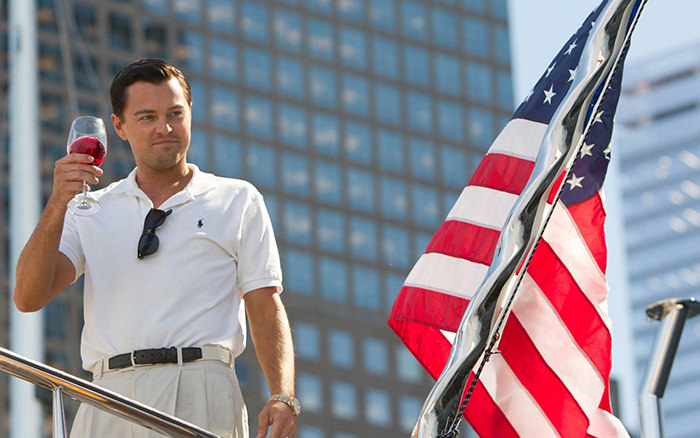The Wolf of Wall Street
 It’s time to face the fact that the Martin Scorsese we used to know, the one who made intimate, quirky, mid-level movies like The King of Comedy, After Hours, and Taxi Driver, is long gone. Bringing Out the Dead, made in 1999, was the last of what one could call Scorsese’s small films — that was a quarter of a century ago. Scorsese makes big movies now, long, indulgent epics. One of them, Hugo (2011) was magical and transcendent. The rest have been overwrought, over-thought, repetitive and ultimately, to varying degrees, unsatisfying (Gangs of New York, Shutter Island, The Departed, The Aviator). The Wolf of Wall Street can be added to that list.
It’s time to face the fact that the Martin Scorsese we used to know, the one who made intimate, quirky, mid-level movies like The King of Comedy, After Hours, and Taxi Driver, is long gone. Bringing Out the Dead, made in 1999, was the last of what one could call Scorsese’s small films — that was a quarter of a century ago. Scorsese makes big movies now, long, indulgent epics. One of them, Hugo (2011) was magical and transcendent. The rest have been overwrought, over-thought, repetitive and ultimately, to varying degrees, unsatisfying (Gangs of New York, Shutter Island, The Departed, The Aviator). The Wolf of Wall Street can be added to that list.
Faithful to a crazy but apparently true autobiography, The Wolf of Wall Street is the three-hour, rags-to-riches-to rags-story of a New York stockbroker, Jordan Belfort, played by Scorsese’s go-to actor, Leonardo DiCaprio (whose project it was from the beginning). The film follows the structure of many Scorsese movies, a corrupt or tainted rise to power and then the downfall. Now, there’s something intrinsically compelling about rags-to-riches stories, whether it’s an Andrew Carnegie biography, VH1’s Behind the Music, or the story of a morally bankrupt stockbroker specializing in securities fraud. Like watching a slow-motion train wreck, you can’t avert your eyes from the tale of Belfort, his idiotic right-hand man (played with relish by Jonah Hill) and their forlorn, numbskull friends.
The film’s best scenes are small, intimate ones: an hilarious vignette of Belfort’s friend Brad (Jon Bernthal), pathetically holding court in his backyard, a clip that wouldn’t have been out of place in one of Scorsese’s late ’60s short films. A sequence on Belfort’s yacht, wherein he spars with an FBI agent on his trail (excellently played by Kyle Chandler) has an undercurrent that’s both humorous and menacing. The early scene, in which Belfort gets a job selling penny stocks in a decrepit strip mall and wows his fellow employees with his sales tactics, is perfect.
Too much of The Wolf of Wall Street, though, is given over to debauchery. Sex, drugs, and money are the only motivating factors for our protagonists and the parties, profane pep talks and Caligula-like orgies become very repetitive. We’re spending three hours here with some extraordinarily shallow people. To which Scorsese might say, “That’s the point.” For this viewer, though, the movie could have been shorter or the time allotted for extravagant bacchanals given over, instead, to characterization. And I believe I can go through the rest of life without again seeing a candle stuck up Leonardo DiCaprio’s butt.
The amount of talent involved is undeniable. Scorsese’s longtime comrade Thelma Schoonmaker edits expertly, giving service to Scorsese’s varied directorial flourishes. Matthew McConaughey has an eccentric bit in a fine restaurant you won’t forget. Jean Dujardin has a choice role as a Swiss banker and Rob Reiner plays Belfort’s father. He helps contribute to the film’s then-record of the most uses of the F word: between 506 and 569 uses. That’s a lot of F’s.
—Michael R. Neno, 2014 Oct 14